The Entrepreneur Experience 2021 takes place this Friday and Saturday in Ballymaloe, Co Cork. It is a unique event that allows 24 emerging entrepreneurs to gain access to 24 business leaders over 24 hours. The event is organised by CorkBIC and is supported by its partners Cork County Council, Cork City Council, Grant Thornton, Broadlake and The Currency.
Pete Smyth, the founder of Broadlake and captain of the Entrepreneur Experience, has previously told The Currency what participants can expect to gain by having their businesses matched to a seasoned entrepreneur. The 24 companies are divided into three groups:
- The Early Stage Group
- The Investor Ready Group
- The Scaling Group
So, who are the 24 companies who have been selected to attend?
*****
Group One: Early stake entrepreneurs
*****
All about the optics for BioPixS
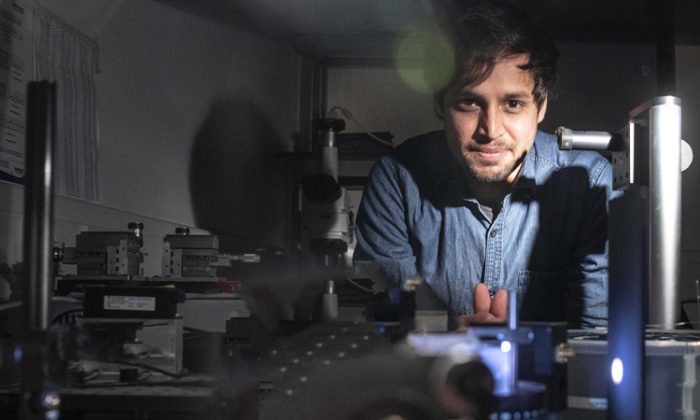
Health-tech entrepreneur Dr Sanathana Konugolu Venkata Sekar set up his company BioPixS to create medical products that will eliminate the need for animal testing in clinical trials and reduce the cost and time needed to develop hi-tech biomedical devices.
BioPixS uses light-based technology to create what are called ‘phantoms’ – materials that mimic the optical properties of human tissues. He is an expert in the scientific field of biophotonics, which uses light to treat and cure human illness.
After the company launched mid-last year, it attracted some customers such as VASCOVID, an EU-funded project for monitoring microvascular health in Covid-19 patients, and it has raised €1 million in funding though five grants.
“We are dreaming of becoming a one stop solution company for biophotonics applications,” said Konugolu Venkata Sekar.
About 90 per cent of BioPixS’s business is overseas but having Ireland as a base has its advantages stated Konugolu Venkata Sekar as Ireland provides “great support for emerging companies and entrepreneurs, making it an ideal place to start business.”
Konugolu Venkata Sekar, originally from India, saw the potential of light-based technology while completing his PhD at Politecnico di Milano in Italy. He quickly realised that although tissue phantoms are widely used across labs, they are poorly standardised. A more consistent approach he felt could lead to new technologies in biophotonics being developed faster and reduce the number of animals used in preclinical research.
BioPixS is a spin-out project from Tyndall National Institute UCC, IPIC SFI Research Centre, and UCC Innovation. Konugolu Venkata Sekar co-founded the company with Stefan Andersson-Engels and David McGovern.
ByoWave aims to be a game changer
As childhood friends, Brandon Blacoe and Eibhlin O’Riordan spent hours playing video games together. As they got older, they grew apart, but a decade later met again. When they caught up, O’Riordan told Blacoe that she was no longer able to play video games because the shape of generic game controllers is not compatible with a disability she has.
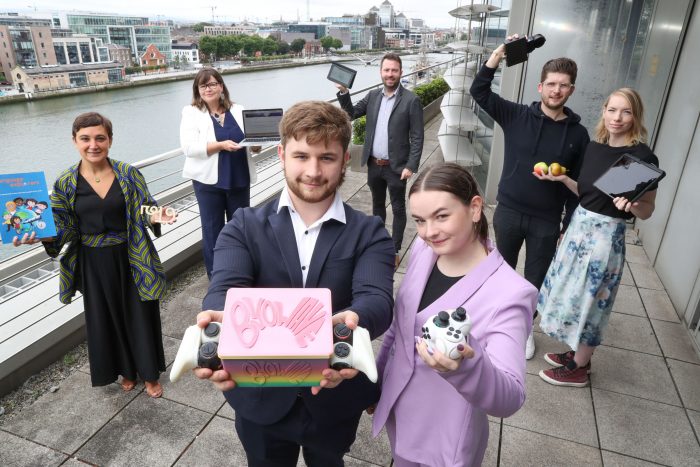
The two friends decided to found a business to make video gaming more accessible. Blacoe is an electronic engineer with a Masters in electronic and computer engineering from UCD while TUD graduate O’Riordan is a game designer. They founded ByoWave in June 2020 as a company that develops modular and accessible video game controllers for disabled gamers.
A multi-award winning business, Byowave got off the ground with the help of GMIT Innovation Hubs Incubation Space, and support from Enterprise Ireland.
They have developed patented assistive technology including their own video game controller and a suite of software tools that gives users the ability to build their own way to play.
They want to establish a subsidiary in the US in the coming six months and create up to 30 jobs over the next five years. They are also seeking potential investors and accelerator opportunities.
From sheep to whiskey for Glen Keen Estate
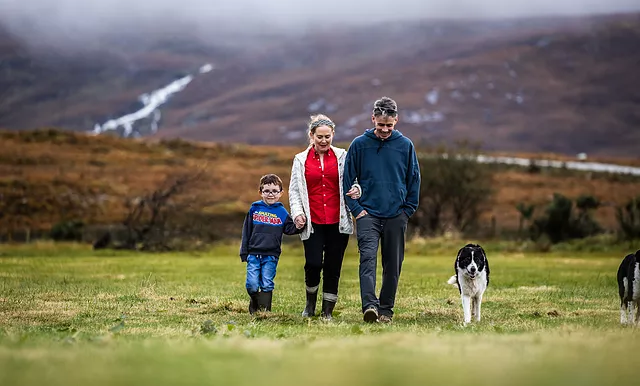
Catherine O’Grady Powers and her husband Jim.
Catherine O’Grady Powers has worked in tourism and hospitality for over a decade and has developed a knack for spotting a trend. In 2014, O’Grady Powers and her husband James (Jim) Powers III opened the gates to their agri-tourism venture Glen Keen farm, one of Ireland’s largest sheep farms, sprawling across 5,500 acres in Mayo.
Now the couple have turned their attention to a new venture, a premium Irish whiskey export business called Glen Keen Estate Whiskey, which they started last year. They want to bring their whiskey to Asia which they see as a huge market.
O’Grady Powers is also the director for the Mayo North East Partnership Company for rural development so she has hosted various government and trade delegation visits from Asia to Ireland. James Powers III has a background in science that includes aeronautics, meteorology and botany.
The company will produce premium small batch single malt whiskey which will be cut with the water that flows through the estate, which is in a special area of conservation.
A team effort with GoChallenge
Royal College of Surgeons Ireland graduate Dr Caitriona Mooney wants to get workplaces moving with GoChallenge, a business she co-founded with entrepreneur John Barron, who was previously the co-founder of SaaS based company Vennetics.
Mooney believes that the mindset, performance levels and culture of a team or organisation are intrinsically linked to each individual’s wellbeing on that team. The GoChallenge Platform and app lets staff engage in activity based challenges that help to cultivate communication and camaraderie.
GoChallenge can be used remotely or in the office to maintain team connections while providing fun activities that benefit both physical and mental health.
“We dream big, our goal is to have people say we’re doing a “GoChallenge” with our team this week,” the founders said.
The founders hope to create 16 new jobs in the next five years.
Being your own barista with Nifty Little Filter

Hannah O’Neill and Jeremy Zethof decided to build a business around the world’s most popular stimulant: coffee.
O’Neill, who is trained in strategic communications, and Zethrof, who has a background in finance, combined their skills to establish their own presence in the booming specialty coffee industry. Their business called Nifty Little Filter was founded earlier this year.
The business provides coffee lovers with portable products such as mini coffee filters people can use wherever they are.
Although the company is in its early days, its two founders already have ambitious plans to create 10 to 15 jobs within the business over the next five years and they want the company to be exporting its products across Europe in 2022.
Tackling climate change with Offsetter
Adam Hynes and John Kelleher met while studying software development at Munster Technological University. After college Hynes built backend software for companies including Atlassian Jira, the most widely used project management tool in the world. Meanwhile, Kelleher spent 11 years in Sydney working across different sectors including cyber security and financial services.
The old friends stayed in touch and soon learned that they had a common worry. As fathers they became increasingly anxious about the impact climate change is having on the world and they wanted to do their part to combat it. So they created Offsetter.
Offsetter is a platform that provides a simple way for individuals and businesses to calculate, track, reduce and offset their carbon footprint.
“We have a combination of extremely strong tech and product building skills combined with a deep knowledge of the climate change space and the solutions needed, all the while being extremely driven to make an impact on the problem,” stated the founders.
One of the main reasons for founding Offsetter in Ireland was because of the access to grants and funding.
Their next move for the company will be to launch a product aimed at businesses. The founders plan on creating 20 more jobs over the next five years.
Finding a voice with Teleatherapy
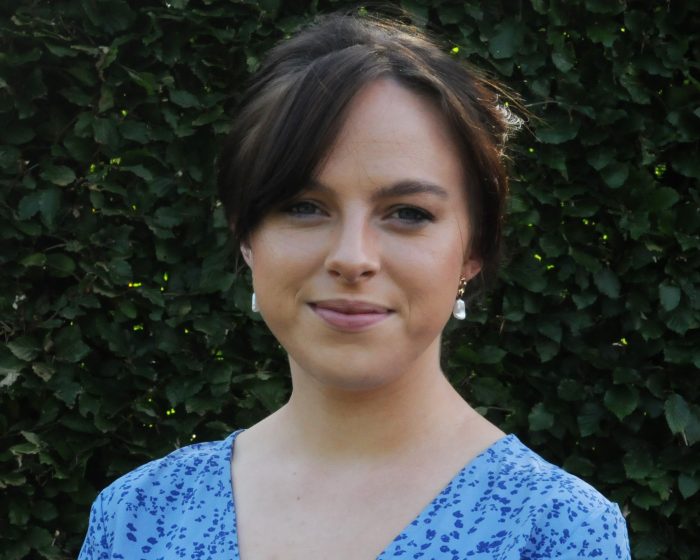
Clare Meskill is a registered speech and language therapist by trade. Through clinical experience and volunteering with Cork Parkinson’s Association, Meskill saw the life changing effect voice therapy can have for people with Parkinson’s disease but also saw how hard it is to access therapy.
Meskill realised there is a need to to create a solution that would make voice therapy more accessible and automated. So she decided to create the solution herself and founded the med-tech startup Teleatherapy.
The company launched in October 2020 and provides voice therapy to people with Parkinson’s disease.
“Early voice therapy intervention helps maintain the voice for up to an additional two years in Parkinson’s patients, but it is difficult to access with public waitlists and private costs. Teleatherapy bridges this gap by providing a tech solution that enables patients to practice from home while giving real-time feedback to clinicians on their progress,” Meskill said.
Teleatherapy aims to be the leading technology provider of speech therapy for Parkinson’s and other neurodegenerative diseases such as motor neuron disease, and multiple sclerosis etc.
The focus for Meskill now is on launching her company in the private healthcare market in the US and finding a technical co-founder and partner. She also hopes to grow her team by creating 17 more jobs in the company.
SeqBiome is looking under the microscope
Dr Marcus Claesson is the founder and CEO of Cork-based startup SeqBiome, a B2B company that gives insights into how tiny microscopic organisms interact with food ingredients in our digestive systems.
The company was created to provide more information, around how things we ingest are broken down by the body, to agri-food-pharma companies. SeqBiome does this through analysis and DNA sequencing of microorganisms within bacteria, fungi, protozoa, and viruses which make up a body’s ‘microbiome’.
Claesson, who is a principal investigator at APC Microbiome Ireland and is bioinformatician and microbiome scientist with a primary interest in inflammatory bowel disease, teamed up with Prof Paul Cotter and Brad Wrigley to create SeqBiome.
Cotter, CTO of SeqBiome, is a molecular microbiologist and the head of food biosciences at Teagasc and is also a principal investigator at APC Microbiome Ireland and Vistamilk SFI Centres. Wrigley, SeqBiome’s CCO, has 20 years of experience as a manager, entrepreneur, investor and CEO in various companies including Accenture and Dell EMC.
The company was founded in July 2020 and is a biotech spin-out project from UCC. SeqBiome was one of 10 startups to take part in the PepsiCo Greenhouse Accelerator programme earlier this year So far, the company has received no investment and has covered all costs through revenue from the 20 clients it has attracted over the last 15 months. These clients include Nestlé, MARS Petcare, the Alpinia Institute, and Microbion. Around 75 per cent of the company’s clients are from outside of Ireland.
The team behind SeqBiome wants to grow from 10 employees to 20 in the next five years.
*****
Group 2: Investor Ready Entrepreneurs
*****
Cilter aims to be a tech leader in child protection
In 2017, Rena Maycock set up Cilter, a start-up that provides and develops embedded child-protection software for smartphones, with her husband Feargal Harrington.
If Cilter is used on a child’s phone, it will detect and block cyberbullying, grooming, and suicide/self-harm content through messaging apps. As it is not an app itself, but built into the device, Cilter cannot be deleted and can access all incoming, and outgoing data.
The software will also alert the guardian if their child does receive harmful content and gives the guardians advice on how to handle each situation. Cilter has developed a prototype that can tackle harmful content within encrypted messaging apps like WhatsApp as well.

Since it’s launch three years ago, Cilter has been endorsed by UNESCO and it has secured agreement from both the Irish government and Vodafone to partner on a pilot programme. But it still hasn’t raised any funds Maycock explains.
“We are perceived as high-risk because we will sell to high-volume. We are deep-tech, so our development runway is longer than a traditional B2B enterprise SaaS product and VC’s prefer to fund commercialisation, not development,” said Maycock.
“There is very little appetite for seed-investment right now,” she added.
The lack of outside funding has not impacted Maycock and Harrington’s vision for the business though. “Our ultimate mission is to be the machine-standard parental control available on all computing devices,” said Maycock.
Maycock and Harrington have their sights set on bringing Cilter to other markets as the parental control market which is forecast to be worth €8 billion by 2023.
Before creating Cilter, Maycock worked in sales and management roles for radio stations while Harrington began his career in residential property sales. During the recession the pair created their first business together called Intro Matchmaking. Harrington is now expanding the business abroad through franchising with Intro Austria, which launched earlier this year.
Coroflo is a new parent’s breast friend
Coroflo takes the guesswork out of breastfeeding with its patented nipple shield device and app that lets mothers monitor how much milk their baby is getting in real time.
The founders of the company Rosanne Longmore, her cousin James Travers and his wife Dr Helen Barry, claim that their product is the world’s first accurate breastfeeding monitor.
“Concern regarding low supply is the main reason mothers stop breastfeeding. By tackling this global problem, we aim to address the drastically low breastfeeding rates across the world,” Longmore said.
Since its launch in 2017, approximately €4 million has been invested in the company. Most of this money came from private investors and an accelerator grant from the European Commission under its Horizon 2020 programme.
Over the next five years the founders want to create 19 jobs in Coroflo and expand the network to make the breastfeeding monitor more accessible.
The idea for Coroflo came about when Longmore was talking to Travers and Barry about their own personal experience with breastfeeding. They all thought that there should be something that provides more accurate information around how much milk a baby gets. And so their groundbreaking breastfeeding monitor was born.
Nutrition with Juspy
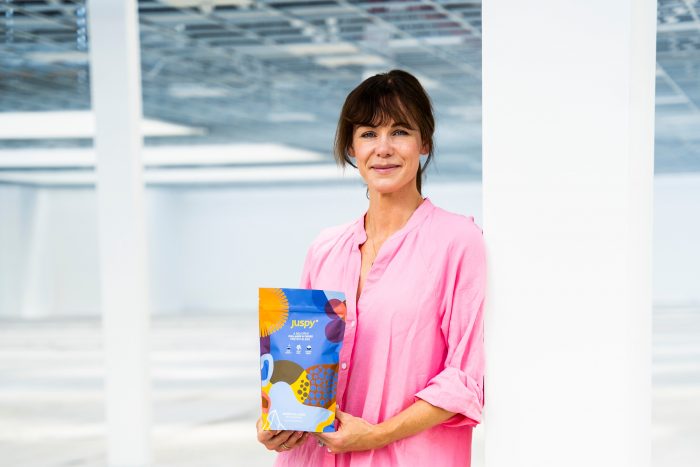
Leonie Lynch has worked in the health and wellness industry for over 12 years. Along the way she has been a movement coach, pilates instructor, a pre and postnatal specialist, animal flow instructor, and, her latest title, entrepreneur.
After having a baby, Lynch went through a period of searching for quick and tasty ways to get nutrients into her body. She saw that there was a gap in the market and decided to create her own company, Juspy, that creates and sells a collagen powder blend product used to create DIY energy drinks.
Since launching in 2016, Lynch has developed a product using marine collagen, instead of bovine collagen which was in the original formula. The fish smell is removed during production and no refined sugar, stabilisers or additives are added in.
Lynch originally created a chocolate flavour drink blend, but during the pandemic she reinvented the powder so that it could be used in food or drink.
“Before I had a product, I applied for a trademark for Juspy in the EU, US, China, Singapore and Australia. I have always had global ambition for Juspy and that is still my focus. To build a global brand based in Ireland,” Lynch said.
Juspy’s products launched on Amazon in Britain and Germany earlier this year and the company was recently picked to join Amazon’s invite-only Launchpad programme for fledgling startups looking to get into international markets.
Kuul Play moves into the wellness market
Clare McSweeney has spent more than a decade working in physical education (PE) with both adults and childrens in Ireland and the US. Her mission is to get as many children as possible engaged in physical activity so they will have healthy lives. With children learning from home during the pandemic, McSweeney was inspired to create a digital platform where kids can do PE anytime and anywhere.
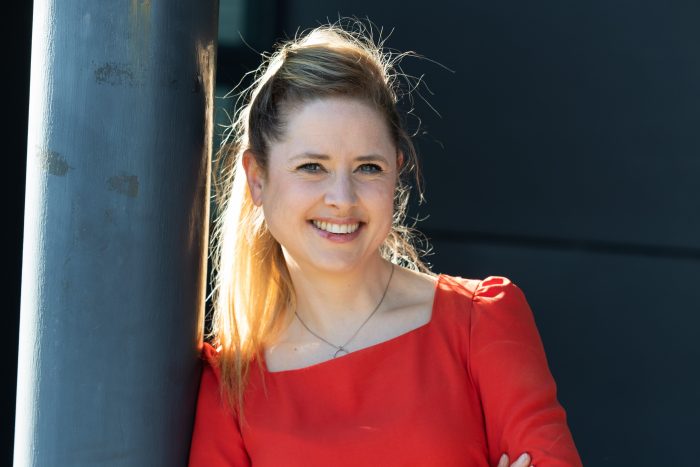
McSweeney founded Kuul Play in 2020 but officially launched the business in March 2021. Kuul Play entices children, especially non-sporty ones, to use their screen time to become more active through instructional, interactive, and gamified digital content that enhances whole child wellbeing, especially within the home environment. The platform can be used by both children and their teachers.
McSweeney has already launched her business in the US and is seeking investment. Earlier this year she took part in Enterprise Ireland’s New Frontiers programme to get her business up and running. Over the next five years, she hopes to create 20 jobs through Kuul Play.
Paul O’Shea’s feeling Peckish
Paul O’Shea is a computer science graduate from UCC with eight years of hospitality experience from Ireland and the US as well as experience in software project management. In 2019 he merged all of this knowledge to found Peckish.
“I want Peckish to be the last and only food app anyone needs to download,” said O’Shea.
Peckish is a SaaS-based menu management and marketing service for restaurants. It puts menu items online and targets consumers by allowing them to search for tailored recommendations based on personal preferences and dietary requirements from multiple online delivery and collection services.
The platform also provides restaurants with analytics on consumer activity related to their menu along with an easy to use menu management system where they can upload, edit and advertise new menu items in compliance with the FSAI.
“We can match the right dish to the right customer based on their personal or dietary requirements by advertising the restaurant’s specific menu items, saving consumers checking multiple websites to find exactly what they want,” said O’Shea.
Style Wrapped up by Shana Chu
Shana Chu has over a decade of experience working in clothing design and manufacturing, but she has always been a big believer in leveraging technology to bridge gaps between designers and factories to support consistent sizing, production, and sustainability. This is what sparked the idea for her cloud-based tech company Styl.Wrap

The company reduces waste and over-production from the fashion supply chain while reducing high levels of returns from e-commerce customers by creating a solution to individual sizing and fit issues. This could save brands millions each year.
Styl.Wrap was founded in 2018 and was inspired by her own fashion background and research on the relationship between retailers and factories. Chu saw the opportunity was bigger than just solving sizing for online shoppers.
“Our ambitious plan is to streamline manual production, reducing timelines, removing waste, and cutting through environmental problems caused by fashion. By removing waste and slashing environmental impact we remove the guilt of enjoying fashion for shoppers while making positive impacts on retailers’ bottom lines,” said Chu.
Chu’s immediate plans are to move into international markets and she plans to hire 20 key staff over the next three years.
James Northridge builds UrAbility

James Northridge’s startup UrAbility wants to reinvent the way parents and educators support children with disabilities, enhancing the learning experience with an online training and support model.
UrAbility’s TechSelect feature, which is a real-time assistive technology tool that will help schools to select and understand technology for all learners. TechSelect’s algorithm chooses the best fitting technology for students with disabilities. These recommendations are based on the student’s technical abilities, spoken language, and location. All real-time recommendations contain video demonstrations of how the student can use the technology to engage in the learning in an inclusive manner.
Northridge struggled throughout school due to his own learning challenges and ended up dropping out of university. He eventually decided to return to college and earned a first-class honours degree from University College Cork and a Masters from University College Dublin.
He has gone on to complete a three year Marie Curie Fellowship at UMass Medical School in Boston. He also won the Young Researcher of the Year at the International Conference on Computers Helping People with Special Needs (ICCHP) in Austria.
He still struggles daily with his reading and writing, but has figured out strategies that work for him, one of which is having the right technology in place. He wanted to spread his knowledge on how to learn in the face of adversity and subsequently created UrAbility in 2014.
After coming up with the idea for his business, he took part in UCC’s IGNITE programme and won Overall Best Business and Best Presentation awards in April 2020.
In the last year and a half when UrAbility’s platform went on the Irish market, it generated €200,000 in turnover. Northridge stated that UrAibily will help 100,000 families in the next five years through the company’s online technology support and peer to peer community. He also wants to break into the US market in the next 12 months.
“For us, working within the education sector, it’s a numbers game. In the US there are 56 million children in primary and secondary combined, that’s compared to the 950,000 here in Ireland,” said Northridge.
Riley takes the pain out of period
Three friends Fiona Parfrey, Lauren Duggan, and Áine Kilkenny founded their period health company Riley earlier this year. They wanted to create a business that provides eco-friendly period products that are effective, comfortable, and less harmful to the environment.
The West Cork-based company provides boxes that only contain environmentally-friendly products that are all made in the EU from 100 per cent organic certified cotton with no added chemicals or toxins. The business has a subscription model for its users and boxes start from €6.90 a month for 16 tampons or €9.90 for 12 pads.

“We deliver our ethically sourced products to our customers’ doors. They are made with 100 per cent certified organic cotton, and are vegan-friendly, toxin-free and chemical-free. Riley products and wrappers are compostable so do not contribute to landfill. They are better for your body and better for the planet,” said the founders.
The average woman uses more than 11,000 pads or tampons in her lifetime, and all of this waste is non-recyclable. This leads to scenes of pads and tampons in landfills, in incinerators, and washed up on beaches if they are flushed down the toilet. Menstrual products were the fifth most common item to be washed up on European beaches, according to a 2018 EU report.
The goal is to get corporate subscribers and supply staff bathrooms and college campuses. They are currently raising their investment through their first fundraising round.
*****
Group 3: Scaling Businesses & SMEs
*****
DigiTally protecting perishables
Patrick McDermott set up his company DigiTally in 2018 to help hospitality businesses manage their inventory for catering.
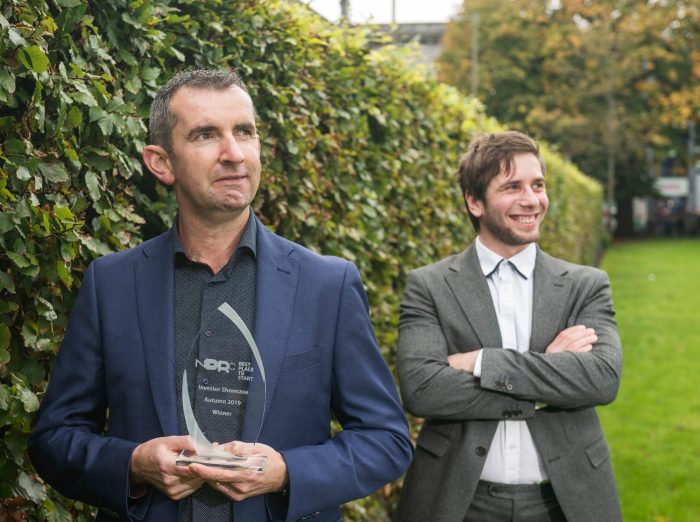
DigiTally software works with contract catering and hospitality businesses to count, collate, and report on their gross profit margins. By digitising the manual stocktaking process (of non-barcoded products), users benefit from increases in gross margins, reductions in food waste, and significant improvements in operational efficiency.
“Many in hospitality “currently conduct inventory counts manually using pen and paper to count, and complex error prone excel spreadsheets to manage their margins. By managing inventory in this way, it results in incorrect data, wasted time, and delayed reporting. And for perishable items of inventory, that is not ideal,” said McDermott.
DigiTally is used in over 200 sites across Ireland and is currently expanding into the UK. In September 2021, DigiTally recruited its first UK based member of its team, bringing the company’s staff head count to 10. McDermott hopes this number will grow to 60 in five years’ time.
Workplace Safety with HaloSOS
In 2017, Fiona Moloney and Liam Darling founded HaloSOS, a wearable safety start-up that provides a wrist-worn alert device for hotel workers. This aims to ensure hotel staff safety during a threatening situation.
The business has launched in the US hotel market as more hotels sign up to the Five-Star Promise brought in by the American Hotel and Lodging Association (AHLA), which is aimed at protecting staff safety.
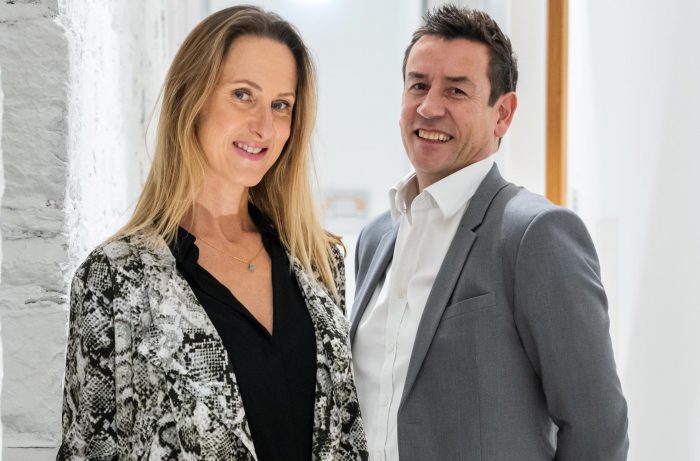
“Our first market is the USA where staff who work in hotels are protected by legislation and the biggest hotel brands have promised their staff that they will protect them in their USA hotels with technology that can locate them to room level if they need help,” stated the founders.
Since launching, the company won the award for most investable business at the CorkBIC International Security Accelerator and raised €159,000 on the Spark Crowdfunding platform with Enterprise Ireland agreeing to provide match funding of €175,000 in two stages.
As Covid-19 decimated the hospitality industry, including hotels, it had a knock-on effect for HaloSOS. The founders brought the company back to Ireland during the pandemic, but they are still committed to their business in the US and want to set up a subsidiary over there in the next 18 months. The founders also hope to create 16 jobs over the next five years.
Nutritics aims to be the number one company for food information
Brothers Damian and Ciaran O’Kelly founded Nutritics, the recipe development and menu management software for the food industry, in 2013 after they saw a gap in the market for a food information database.
The founders claim it is the only software business globally to be independently accredited by the European Food Information Resource Network (EUROFIR) for accuracy in recipe calculation methods.
Their software facilitates compliance with food law alongside helping operators to manage and publish menus. Their technology links food information between suppliers, operators, and customers.
Earlier this year, Nutritics acquired Ten Kites, the UK’s leading menu publishing platform. Their technology enables operators to publish customised and live menus to any digital resources including digital menus, signage, POS and apps.
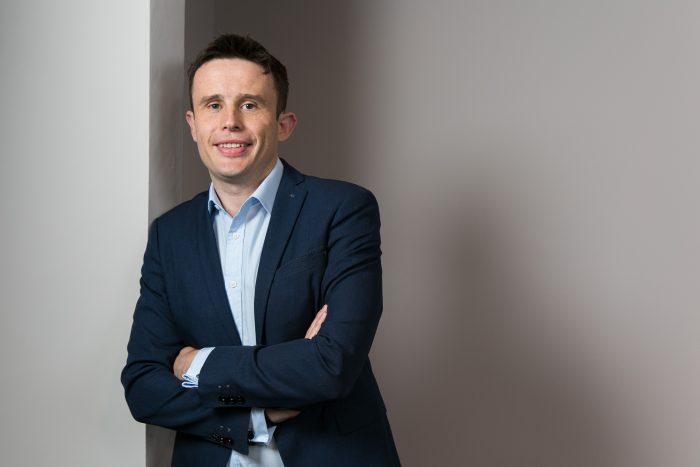
The company’s clients include restaurant chain Leon and Starbucks. In addition to hospitality, it has extended its offering to healthcare, education, and elite sports sectors, where their software includes dietary management, meal planning and patient ordering modules.
Nutritics Health is used by the UK’s National Health Service (NHS), Public Health England and Manchester City Football Club, as well as many universities in Ireland and Britain.
Shortly after it was created, Stephen Nolan joined Nutritics and is now the managing director of the business, having previously held the role of COO. Prior to joining Nutritics, Stephen worked with Deloitte and the Australian bank Macquarie.
The company wants to create over 100 jobs in the next five years.
Cleaning up the seas with OceanЯ
Tom Cotter built a career in sales and marketing, mostly in the leisure sector in Melbourne. But when he came back to Ireland, he began to notice two things – the pollution problem happening in oceans worldwide, and the lack of colourful sea swimwear available to those who like to go for a dip. So, he and Alex Musgrave and John Downey decided to create a solution.
Cotter is the founder and CEO of OceanЯ, a company that makes sustainable rash vests from 100 per cent recycled ocean waste. All clothing is designed in-house using eco-friendly materials and plastic free packaging.
Cotter stated the company aims to own three eco-friendly production facilities producing 50,000 sustainable garments every month and working with 2000 organisations worldwide.
The immediate plan for the business is to increase its presence in international marketing over the next three years and hire 50 people in the next five years.
Viva vsource
James Galvin initially launched his talent sourcing start-up vsource in 2007, but relaunched the company earlier this year. The company provides technology to scaling companies that helps them in talent acquisitions.
“Unlike staffing firms, who charge based on placements, we focus on the sourcing funnel, which means we can remain aligned to the long-term best interests of the client and commit to broad and thorough research without temptation to cherry-pick,” said Galvin.
Galvin added that he has big ideas for the company but he has to “try to stay grounded.” Among these plans is to create 120 jobs in the company over the next five years.
SymPhysis Medical makes lung fluid draining easier
Tim Jones and Michelle Tierney founded SymPhysis Medical in 2018, a company that develops a home-based medical device which will help late-stage cancer patients suffering from breathlessness due to fluid build-up around the lung.
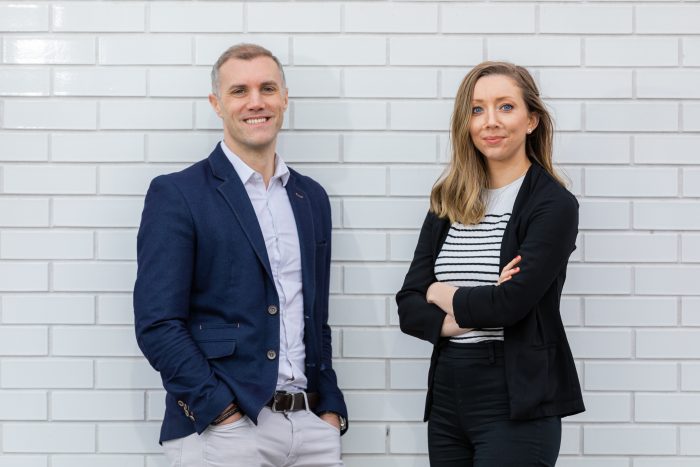
The founders claim that the catheter-based is a first-of-its-kind technology that lets patients invasively drain the fluid from their lungs themselves, and will enable clinicians to monitor patient’s progress remotely.
The founders are currently looking at securing seed funding, so they have a sufficient runway to commercialise their technology. The company plans to raise further funds in 18 months with a Series A raise.
The company is also developing a new technology called Releaze, which aims to be the simplest way for palliative lung cancer patients to self-drain lung fluid. The company aims tolaunch this in 2023 to an international market, and create 10 more jobs in the next five years.
The Galway-based Med-tech company is a spin-out project from NUIG.
Thriftify – The Amazon for charity shops
Rónán Ó Dálaigh and Timur Negru are looking to change the way charity shops do business with their start-up Thriftify, which they set-up in 2018.
The founders describe their company as “Amazon, but sustainable and ethical.” The company is an omni-channel, e-commerce platform that connects charity shops with consumers.

“Used, sustainable fashion is the fastest growing fashion segment. Our mission is to put charity retail at the heart of the sustainable fashion revolution,” states the founders.
Thriftify is currently looking to establish a presence in the UK, Germany, Canada and the US and aims to create 280 jobs in the next five years.
WrxFlo aims for €21 million in turnover
Former Actavo director Tim Crowe, and former senior programme for Actavo Ken Sheehan founded WrxFlo in 2019.
The company gives business leaders real-time KPI data from customer order receipt to order delivery on any device in any location. It also tracks value returned to the client from KPI data.
The founders plan for their company to have a turnover of €21 million in five years with 40 per cent EBITDA and 64 employees.
More recently, the company has recently completed projects in China, Brazil and Germany. “Our global experience in Dell has helped us establish ourselves in these markets and we plan to build further on that,” stated the founders.
Both Crow and Sheehan spent several years building and running most of Dell’s current global manufacturing sites before they worked in Actavo. In founding WrxFlo they wanted to build a software application they wished they had when they ran global factories.
*****
The CorkBIC 2021 Entrepreneur Experience will take place on October 15 & 16 in Ballymaloe, Co. Cork Partners for the event are: Cork City Council, Cork County Council, Grant Thornton, Broadlake & The Currency; Follow #EntExp24 on all social media and go to www.corkbic.com for all event updates.


